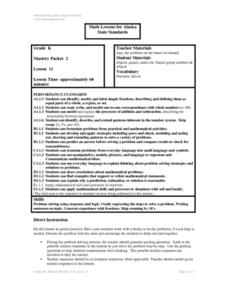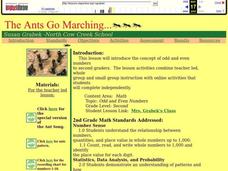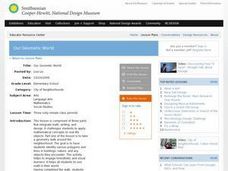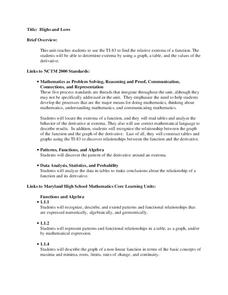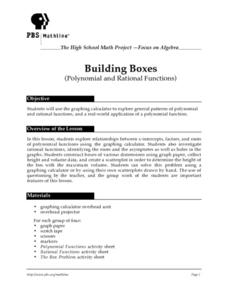Curated OER
Introduction to Infinite Series
In this infinite series worksheet, students explore the pattern in a series of numbers. They solve a sequence of partial sums and identify the limit. This two-page worksheet contains explanations, examples and approximately five problems.
Curated OER
Identify the Pattern
Third graders develop a pattern using bean bags. They could kick the bean bag in the air with their left leg a certain number of times, etc. They work in pairs and trade off completely the patterns with one another.
Curated OER
Marcy's Dots
Students identify the pattern changes that could occur in a series using pictures with dots. They use the patterns on the worksheets to have a context to describe pattern in words. Students look to find the linear, quadratic, or...
Curated OER
National Symbol Patterns
Students discuss and create their own patterns. They practice and improve on making patterns of their own using red, white, and blue paper for a national theme. The symbols are based on what the teacher picks for the class.
Curated OER
Patterns, Relations And Functions
Fourth graders observe patterns and determine a mathematical function that creates the pattern. Through a demonstration by the teacher, they observe strategies such as multiplication, division, addition, and subtraction to use when...
Curated OER
Functions and Graphs -- Pattern Detection #1
Students discuss the job of an archaeologist by determining how people have used their environment. Using a graph, they analyze the patterns and functions of Native Americans in Arizona using maize. They work together to answer...
Curated OER
Changes in Force, Motion, and Energy
Eighth graders construct various machines and compare the work done by them.
Curated OER
Linear and Exponential Models
Students linearize data to determine if an exponential model is suitable. In this linearizing data to determine if an exponential model is suitable lesson, students graph the residuals of sets of data that appear to have an exponential...
Curated OER
Fraction Problem Solving Process
Help your charges solve a variety of fraction and skip counting problems using a problem solving process. As a class they work through a fraction problem step-by-step, and discuss a real-life connection to the problem. Students then play...
Mascil Project
Circular Pave-Stones Backyard
Pack the lesson into your plans. Young mathematicians learn about packing and optimization with the context of circular paving stones. They use coins to model the paving stones, and then apply knowledge of circles and polygons to...
University of Georgia
Using Freezing-Point Depression to Find Molecular Weight
Explore the mathematical relationship between a solvent and solute. Learners use technology to measure the cooling patterns of a solvent with varying concentrations of solute. Through an analysis of the data, pupils realize that the rate...
Curated OER
Interpreting Graphs
Sixth graders interpret linear and nonlinear graphs. They create graphs based on a problem set. Next, they represent quantitive relationships on a graph and write a story related to graphing.
Rainforest Alliance
Forests of Guatemala
With 90 percent of its land area covered in forests, Suriname, a country in South America, contains the largest percentage of forests throughout the world. Here is an activity that brings classmates together to learn about the...
Missouri Department of Elementary
Are You Balanced?
Balance scales create a strong visual of how an individual prioritizes one's self alongside their commitments to the community, school, and home. Scholars complete a graphic organizer then discuss their findings with their peers. A...
Curated OER
Odd and Even
Explore the concept of odd and even with your class using this resource. Learners take an online test demonstrating their knowledge of odd and even, sing a song about the concept, and engage in computer-based activities.
Curated OER
Connecting Formulas Related to Geometric Figures
Students identify diagrams of quadrilaterals and circles by different names and classify the figures. They name the areas for each diagram and practice solving the formulas for each.
Curated OER
Our Geometic World
Pupils walk around the neighborhood and identify various polygons and lines in buildings, nature and other objects. They design a building using various geometric patterns, shapes and lines. Students complete a descriptive writing of...
Curated OER
Investigation - Looking For Triangles
Seventh graders investigate a series of triangles, looking for patterns and generalizing what they have found. They analyze the pattern data and organize it into a table and graph. Students identify the relationship and discover the rule...
Curated OER
Interpreting Data from Birdfeeders
What kinds of birds live in your area? Read a book about birds to your learners and explore their feeding patterns. Charts and graphs are provided in this three page packet, but consider assigning the basic questions if using with young...
Curated OER
Highs and Lows
Solve problems using integration and derivatives. By using calculus, learners will analyze graphs to find the extrema and change in behavior. They then will identify the end behavior using the derivatives. Activities and handouts are...
Curated OER
Building Boxes- Polynimial And Rational Functions
Pupils investigate the concepts of polynomial and rational functions. They identify the general patterns used to solve problems. The use of real world contexts in the problems helps to promote engagement and understanding of how the math...
Curated OER
Class of Gold
How can you see a number in nature? Here, learners discover both Fibonacci numbers and the golden ratio by exploring a number of different resources. Note: Some of the resources are older and may be missing some of the links, but the...
Curated OER
Polynominoes
In this polynominoes worksheet, students solve 9 different types of polynominoes problems. First, they identify that a polynominoe is a polygon made from squares of the same size and connected to each square. Then, students determine how...
Curated OER
Searching for Angles and Lines
Young scholars work to find and reinforce concepts related to lines and angles. They identify the characteristics of shapes that have one, two, and three dimensions. The students also work on definitions related to the geometry of shapes.








